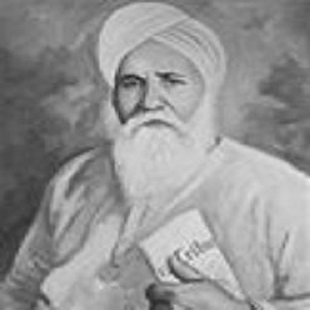
Mota Singh, a resolute revolutionary, was born on 28 February 1888 at Patara, a village in Jalandhar. His father’s name was Gopal Singh. Mota Singh trained as a junior anglo-vernacular teacher after passing the matriculation examination and worked in schools in the Jalandhar and Hoshiarpur districts. He also completed Giani and a B.A. in English at Panjab University, Lahore. From 1914-1915, he was the headmaster of the Sant Singh Sukkha Singh Khalsa middle school in Amritsar and later taught at Khalsa High School in Damdama Sahib, Akal College in Mastuana. During the anti-Rowlatt Bills agitation of 1918-1919, Master Mota Singh entered politics. On 11 April 1919, he delivered his first public speech in front of a large crowd at Shahi Masjid in Lahore, which enraged the British authorities. He was imprisoned under martial law regulations. He was not allowed to wear a turban in jail. To assert his right to wear a turban, Master Mota Singh went on a hunger strike. He was released from prison on the eve of the Indian National Congress's Amritsar session in December 1919. He attended this session. Later on, he joined the Akali movement to free Sikh holy places from the control of a corrupt and effete priestly order, but he disagreed with the nonviolent policy of Akali leaders. The massacre of Sikhs at Nankana Sahib on 20 February 1921 pushed him over the edge into radicalism. During the Sikh Educational Conference in Hoshiarpur from March 19 to 21, 1921, he and Kishen Singh Gargajj, along with a few others, held a separate secret meeting and devised plans to eliminate those responsible for the Nankana Sahib tragedy. However, police were able to obtain this information, and the men assigned to the task were arrested on May 23, 1921. Warrants were also issued for Master Mota Singh's arrest. After that, he went underground. He played hide-and-seek with the police for a year. He would appear unexpectedly at a Sikh divan or religious gathering, deliver a fiery speech against the British government in full view of police, and then, much to their chagrin, vanish. Finally apprehended on June 15, 1922, he was sentenced to seven years in prison, which he served in various jails in India and Burma. He was released on June 23, 1929, only to be arrested again the next month. During 1942-1945 Quit India movement, Master Mota Singh was also imprisoned. He was elected to the Punjab legislative assembly as an Indian National Congress nominee in 1952 but later left the party to work actively in the Kisan Movement, becoming president of the District Kisan Sabha, Jalandhar. Master Mota Singh remained unmarried. On 9 January 1960, this resolute Indian patriot died in Jalandhar’s Civil Hospital suffering from paralysis